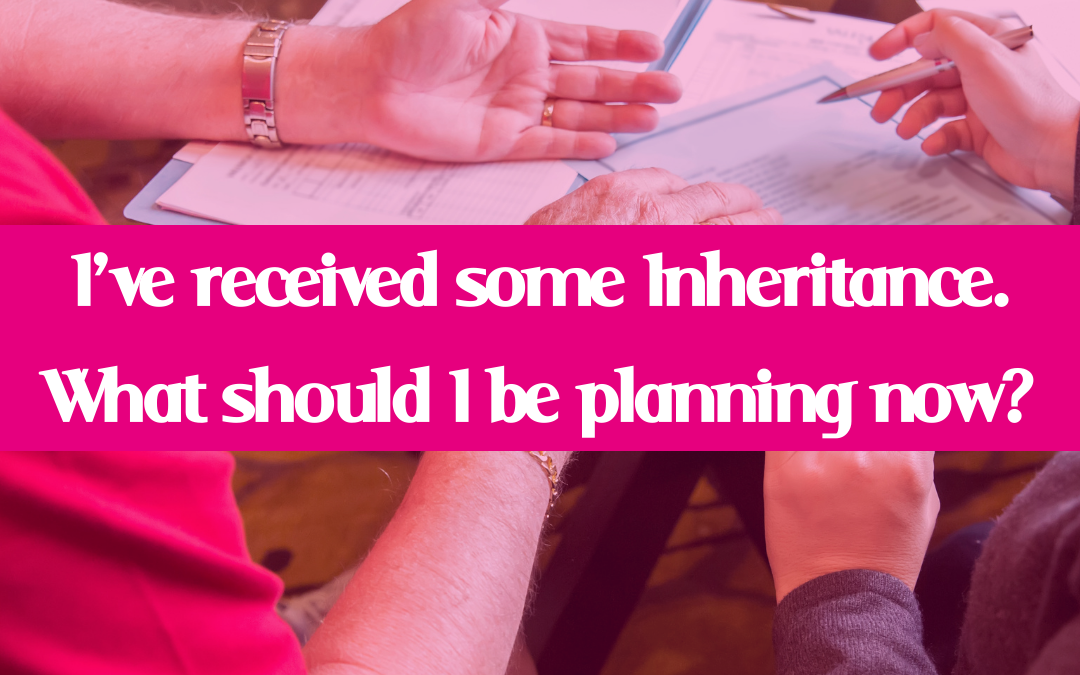How lovely! Most people would be envious and agree that this is a wonderful position to be in, but for others it becomes a huge burden and responsibility, particularly if they are not confident about managing money.
Everyone dreams of getting a windfall, but many people who suddenly find themselves with a large gift of cash feel too panicked to do anything more than keep it in a savings account.
At Magenta we understand that “money” and all that word encompasses, means different things to different people and that it is very important to understand this, before giving any advice about what to do with a windfall.
We have had some clients who have passed an inheritance onto someone else or to a charity as if it were a hot potato burning their hands! They didn’t need or want the money for whatever reason and sought to get rid of it as soon as possible. We have helped clients set up charitable trusts and advised on the best gifting strategies to help them decide how to use their inheritance according to their own values.
Others seek advice on what to do with the money – how to invest it wisely for the future; how best to pass it on to the next generation; how, when and if to pay off debt; how to deal with the tax consequences etc
Depending on the size of the windfall, others will have set ideas on how and when they want to spend their money and may seek advice on whether this is sensible and how long the money will last if they spend at a certain rate.
One thing is certain – if clients want to make the most of a windfall, whether from an inheritance, a lottery win or a business sale etc – they should take advice and be prepared to make a lifelong financial plan. This will ensure maximum growth potential, minimise taxation and result in less stress, with greater security and happiness.
Here is our list of suggested things to do with a windfall.
- Take a breath
There is no rush to make decisions. In fact, if you are in an emotional state such as grief at losing a loved one, or shock at receiving a surprise windfall, this is definitely NOT the time to be making big, possibly life changing decisions.
Sometimes the shock of a sudden windfall can trigger some irrational behaviours, such as giving all the money away, becoming a recluse, spending the money lavishly, or hoarding the money.
Our advice is to put the money into a simple deposit account for a short time while you think about what you would like to do and while you get used to the idea of having it.
- Make a plan
Think carefully about how you’d like your life to look in five, ten, and maybe even 20 or 30 years. Where are you living? Are you retired? Travelling the world? Still working, but with less financial stress? Are you involved in charity work? Jot down your ideas so you can keep your vision clear.
Setting goals will inform your decisions about what to do with your money. Once you have a general direction in mind, you can plan more effectively and make the most of your windfall.
Think seriously about consulting a Financial Planning expert – you will need someone who you like and can get along with; who can help you to avoid making expensive mistakes; hold you accountable to your plan; work with you to achieve your goals; make specific recommendations and monitor your progress over the long term.
- Pay off your debts
If you have any expensive debts such as loans, credit cards and store cards, you should pay these off in full before you do anything else. If you don’t have enough to pay off everything, pay off the highest interest rates first and transfer everything else to 0%.
- Pay off your mortgage
Paying off your mortgage is one of the best and safest investments you can make. Once you’ve paid it off, you will feel a big weight off your shoulders—and you’ll own your own home.
However, if you’re on a fixed-rate mortgage you may not be allowed to pay off more than 10% a year without penalties. Work out which would be the best value to you: paying it off now and incurring a penalty, or just paying off an extra 10% each year until the fixed rate finishes and then paying the rest off.
- Boost your emergency fund
You should think about having at least 3-6 months normal expenses in cash, together with any funds that you anticipate spending in the next 12 months.
Ensure that this money is easily accessible and don’t tie it up in low interest accounts – investing the bulk of your money properly for the long term is likely to generate a better return.
If you are retired, we recommend that you have 18 months-2 years’ income set aside in cash at all times, so that you never have to draw down from invested assets in an emergency.
- Treat yourself
Now that you have done all the sensible, responsible things, think about some things you would like in the short term. Perhaps some things you have always dreamed of having or doing?
Why not have that new kitchen, a sports car, a Caribbean holiday etc.?
Once you have a proper future plan in place and know that you can afford to splash out a bit without running out of money, just do it! After all life is not a dress rehearsal and you can’t take it with you ……
- Get your money working for you
Any money not committed to short term spending or your emergency fund, should be invested for the long term to provide ongoing security.
At Magenta we help people to develop an investment plan that is suitable for their attitude to risk; will grow enough to achieve their goals; is not tied up for a long time; is tax efficient; easily understood and is regularly monitored and rebalanced to ensure maximum success.
- Give some away
If you have children or grandchildren, you could help them get onto the property ladder or pay their university fees with some of your windfall.
Rather than leaving money in your will, it might be nice for you to see the benefit of any money you may be able to spare while you are still alive. Your financial plan will be able to determine how much you can afford to give away, either as a lump sum or out of income over the years.
They won’t have to pay inheritance tax on money you have given them if you survive for at least seven years after making a gift.
Be careful though, giving lots of money to children and grandchildren is not always the best idea – it may lead to an unhealthy sense of entitlement and a poor work ethic.
- Give to charity
Giving to a cause close to your heart will benefit others and may make you feel better about yourself too. Some people who come into large sums of money feel guilty about their good fortune. Helping others is a good way to avoid this.
Giving to charity is also tax efficient. Donating through Gift Aid means charities can claim an extra £25 for every £100 you give. If you pay tax at 40% you can claim a further £25 tax relief through your Self-Assessment tax return.
Also if you leave 10% of your net estate as a charitable legacy you may qualify for a reduction in the rate of Inheritance Tax from 40% to 36%.
- Deed of Variation
When you receive an inheritance, you may decide that you don’t need/want it and that it would be better if someone else had it, perhaps because it will compound your own inheritance tax liability.
If this is the case, you have up to 2 years after the death of the benefactor to amend their will in favour of another party or parties. This can only be done with the agreement of all the beneficiaries, but usually within families this is not a problem.
This solution is often overlooked and means that more money goes to the tax man than is necessary, to the detriment of future family funds.
If you, or someone you know has just received a windfall and is feeling overwhelmed and uncertain of the next steps do call us for a friendly chat. It is so important that your money is aligned to all the things you want to do in your life, rather than just invested for the sake of it.

